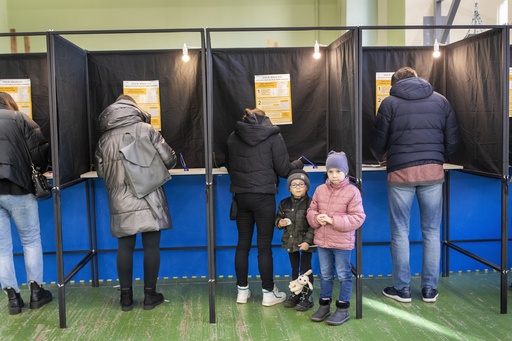
VILNIUS, Lithuania — Following the initial round of national elections held on Sunday, the opposition Social Democratic Party has claimed the lead and expressed intentions to initiate discussions for forming a new government with other leftist factions. This move aims to replace the current center-right coalition that has been in power for four years.
All votes from the first round were counted by Monday, revealing that the Social Democrats secured 18 of the first 70 seats in the 141-seat Seimas, placing them just ahead of the ruling Homeland Union party, which is led by Prime Minister Ingrida Šimonyt?.
A second round of elections is scheduled for October 27, where single-member constituencies will make their selections between the two frontrunners from the first round.
Šimonyt?’s administration assumed office in 2020 and has seen some economic achievements. However, her government faced difficulties due to rigid COVID-19 restrictions and a surge in migrants, which overshadowed its accomplishments. She was particularly criticized for her stringent pandemic measures, with many people arguing that her administration failed to provide adequate support to businesses during lockdowns while others indicated that health care access was insufficient for thousands.
Vilija Blinkevi?i?t?, the leader of the Social Democratic Party, stated plans to form a coalition with the center-left Democratic Union, which obtained eight seats, and indicated that they would endorse each other’s nominees for the next round of elections. She is also expected to engage with the leadership of another leftist group, the Farmers and Greens Union, which garnered six seats.
Meanwhile, the newly created party called Nemuno Aušra, led by right-wing politician Remigijus Žemaitaitis—who faced impeachment earlier this year for antisemitic remarks—managed to gain 14 seats. The Social Democrats have made it clear that they will not collaborate with Žemaitaitis’ party. The final party to acquire seats was the Liberal Union, which secured seven.
These results reflect a long-standing trend in Lithuania’s electoral behavior, where voters have shown a tendency to shift their preference every four years. Margarita Šešelgyt?, director of the Institute of International Relations and Political Science in Vilnius, noted this pattern, stating, “The so-called pendulum principle makes society shift from left to right and so on. Not a single time since the early 1990s have Lithuanians voted in two consecutive elections for the same party to run the country.”
Political analysts suggest that a potential shift towards leftist governance is unlikely to drastically alter Lithuania’s foreign policy, given that the country is a member of both the European Union and NATO. It shares borders with Russia’s Kaliningrad exclave to the west and with Belarus, a close ally of Moscow, to the east. The context of these elections is amplified by the ongoing conflict in Ukraine, which has heightened concerns about Russia’s objectives, particularly in the strategically vital Baltic region.
Voter turnout for the current elections was reported at 52.1%, which is a rise from 47.2% in 2020, according to official statistics.
